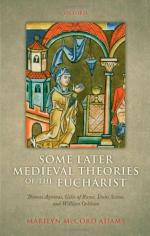|
This section contains 5,178 words (approx. 18 pages at 300 words per page) |

|
SOURCE: "The Structure of Ockham's Moral Theory," Franciscan Studies, Vol. 46, 1986, pp. 1-14.
In the following excerpt, Adams compares and contrasts Ockham's understanding of free will with the ideas of his Franciscan predecessor, Duns Scotus.
1. Gi; 1. introduction =~ Sintroduction
Ockham's moral theory, like his nominalism, finds its place among the most notorious, and yet widely misunderstood, doctrines of medieval philosophy.
- Many take Ockham's as the paradigm of "Divine Command Morality," according to which moral norms are entirely a function of the arbitrary choices of the free will of an omnipotent God. Paul Helm's recent comment is merely representative when he writes,
What can be labelled an Ockhamist Divine Command Theory holds that morality is founded upon a free divine choice. If God commands fornication, then fornication is obligatory, and it is within God's power to do so. He could establish another moral order than the one he has in fact...
|
This section contains 5,178 words (approx. 18 pages at 300 words per page) |

|


